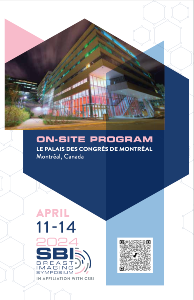Cryoablation Therapy for Breast Cancer: The “What, Why and How”
ePosters

Janice N. Thai, MD
Radiologist
Massachusetts General Hospital
Presenter(s)
Background: Advances in the knowledge of genomics enabled risk-stratification and de-escalation therapy for certain subtypes of breast cancer. Select patients with small, low-risk tumors may benefit from less aggressive non-surgical treatment. Ultrasound-guided cryoablation, an emerging minimally invasive procedure for the treatment of early-stage breast cancer, has proved promising. Recent studies, including two phase II clinical trials, have shown that in patients who meet specific criteria, the technique can be a safe and effective alternative to breast conserving surgery.
Learning Objectives: Understand the indications for cryoablation, techniques and challenges for performing breast cryoablation, imaging characteristics of cryoablation changes in the breast, imaging signs of residual or recurrent tumor and management algorithm.
Abstract Content/Results: Patient selection criteria and contemporary evidence supporting cryoablation treatment of breast cancer will be discussed. Current cryoablation technology and procedural technique will be reviewed, including an overview of the technical aspects of equipment and device selection and procedural protocol. Practical tips and tricks for challenging anatomy/scenarios will be provided and illustrated. A multimodality imaging review of pre- and post-ablation findings will be presented to highlight the spectrum of benign and malignant lesions. A discussion on the oncologic management algorithm for post-ablation adjuvant therapy will be provided, as well as an imaging surveillance algorithm for tumor recurrence. In addition, a proposed multidisciplinary consensus approach to patient recruitment and collaborative effort in long-term patient management will be presented.
Conclusion: Cryoablation offers a promising, less aggressive alternative treatment option for early-stage breast cancer. Careful patient selection and proper procedural technique are essential for achieving technical and clinical success. Knowledge of normal and abnormal findings post-ablation will aid in the expedient diagnosis of tumor recurrence.
Learning Objectives: Understand the indications for cryoablation, techniques and challenges for performing breast cryoablation, imaging characteristics of cryoablation changes in the breast, imaging signs of residual or recurrent tumor and management algorithm.
Abstract Content/Results: Patient selection criteria and contemporary evidence supporting cryoablation treatment of breast cancer will be discussed. Current cryoablation technology and procedural technique will be reviewed, including an overview of the technical aspects of equipment and device selection and procedural protocol. Practical tips and tricks for challenging anatomy/scenarios will be provided and illustrated. A multimodality imaging review of pre- and post-ablation findings will be presented to highlight the spectrum of benign and malignant lesions. A discussion on the oncologic management algorithm for post-ablation adjuvant therapy will be provided, as well as an imaging surveillance algorithm for tumor recurrence. In addition, a proposed multidisciplinary consensus approach to patient recruitment and collaborative effort in long-term patient management will be presented.
Conclusion: Cryoablation offers a promising, less aggressive alternative treatment option for early-stage breast cancer. Careful patient selection and proper procedural technique are essential for achieving technical and clinical success. Knowledge of normal and abnormal findings post-ablation will aid in the expedient diagnosis of tumor recurrence.

